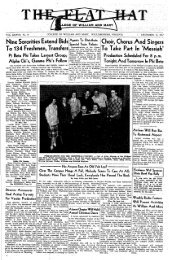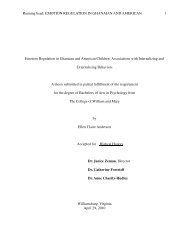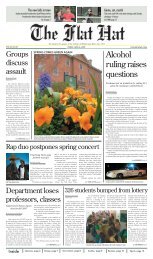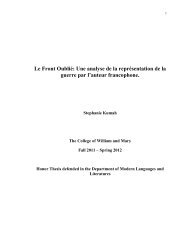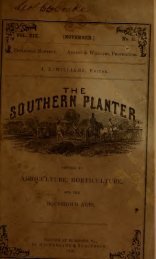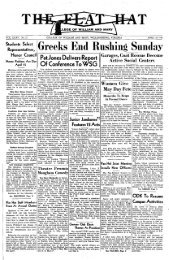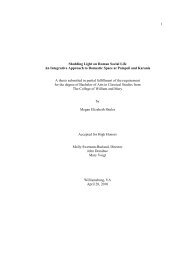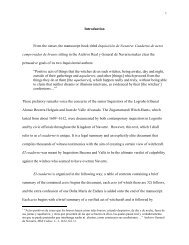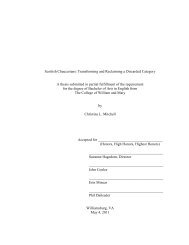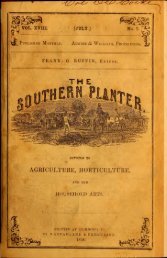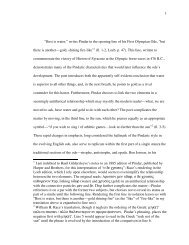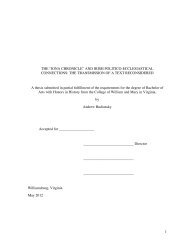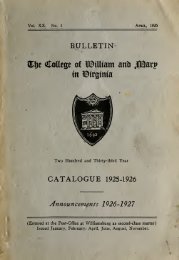Southern planter - The W&M Digital Archive
Southern planter - The W&M Digital Archive
Southern planter - The W&M Digital Archive
Create successful ePaper yourself
Turn your PDF publications into a flip-book with our unique Google optimized e-Paper software.
386 THE SOUTHERN PLANTER. [July<br />
relation to cacli other of cause and effect<br />
so that in the oyster and zoophytes, and<br />
other specimens el' feeble animal existence,<br />
where the nervous system is too rudimcntal<br />
its functions.<br />
Now, what evidence is there that<br />
plants possess either sensation or locomo-<br />
tion ? I believe it has never been asserted<br />
that they have the least pretension to locomotion,<br />
(except by the learned and distinguished<br />
physiologist from whom " B."<br />
quotes, and to whom we will refer again j)<br />
and as locomotion and sensation go hand<br />
in hand, and always co-exist in the relation<br />
of cause and effect ; in the absence of the<br />
one there is no need of the other, and in<br />
the absence of both there is no need of the<br />
organization that produces and presides<br />
over them. Had Nature endowed plants<br />
with such organs and functions, she, in all<br />
probability, would have made them to stand<br />
out in the same bold relief in the one kingdom<br />
as in the other. In all other respects<br />
she has constructed plants with their organs<br />
and functions as conspicuous as those<br />
of the animal kingdom. As animals were<br />
certainly designed for one purpose and<br />
vegetables for another, why can we not<br />
accept these higher attributes of sensation<br />
and locomotion as the distinguishing char-<br />
acteristic—the beginning, at least, of a<br />
separation of the animal from the vegetable<br />
kingdom. To answer the ends of vegetable<br />
life, there is no need of such functions or<br />
such organs, whilst they are indispensable<br />
to animal existence. Every motion in the actions.<br />
animal organism proceeds from the nervous, " B." informs me "I am mistaken in sup-<br />
apparatus. <strong>The</strong> phenomena of motion in posing alcohol innoxious to plants, and that<br />
the vegetable, as the circulation of the sap, I<br />
and the closing of leaves and flowers, depend<br />
on physical and mechanical laws.<br />
Heat and light are the remote causes of<br />
motion in vegetables, their growth and development,<br />
and also the assimilation of<br />
their food, being dependent upon external<br />
circumstances and influences which produce<br />
motion. <strong>The</strong>re are two sets of circumstan-<br />
ces necessary to produce any activity in<br />
vegetables, viz : the presence of matter for<br />
assimilation and of heat and light j the increase<br />
of the plant being dependent upon<br />
the presence of material out of which its<br />
food can be elaborated through the operation<br />
of these indispensable agents; but<br />
heat and light are powerless of them-<br />
selves without the presence of something<br />
upon which to operate. <strong>The</strong>re is no organ<br />
in -the plant whose functions they (that is,<br />
heat and light,) can in the slightest degree<br />
to be demonstrated, we have a perfect right increase, without the presence of pabulum<br />
to infer its existence from the presence of to act upon, and when this pabulum is elab-<br />
orated, assimilation goes on under the con-<br />
trol of a " vis vitx," and growth and development<br />
are the necessary consequence.<br />
In animals, on the contrary, we recognize<br />
a distinct power residing in a nervous system<br />
capable of renewing itself, at every instant<br />
of life—a power peculiar to themselves—self-generating,<br />
depending upon none<br />
of those external influences to which vege-<br />
tables are subject as the source of their<br />
motion, a mere operation of the will being<br />
sufficient to develop it and to produce the<br />
motion which is indispensable to the vital<br />
process. Joy or anger excites it, and disturbs<br />
its equilibrium. <strong>The</strong> action of " mere<br />
stimulants" produces the intensest activity,<br />
without any increase or development what-<br />
ever. *<br />
Says " B.," " <strong>The</strong> gentleman will scarce-<br />
ly deny that when the vital forces or actions<br />
of plants are exalted or quickened, that the<br />
circulation of the nutritious juices in the<br />
plant are at the same time accelerated."<br />
In reply to which we say that " B."<br />
but makes the common mistake of putting<br />
the cart before the horse, or mistaking the<br />
effect for the cause. <strong>The</strong> acceleration of<br />
the nutritious juices, consequent upon an<br />
abundant supply ; that is elaborated under<br />
the influence of heat and light, is what<br />
exhausts and quickens the vital forces or<br />
I will be convinced of the mistake by pouring<br />
strong brandy on a delicate plant." I<br />
am rather opposed to wasting the material<br />
by such an experiment. Could he have<br />
been so indiscreet as to put his to such a vile<br />
purpose ? If he will inform me how I can<br />
persuade his little nervous membranes to<br />
u. imbibe<br />
a mouth-full," I would consent to<br />
spare as much : but I can't stand this<br />
pouring on, as I would not only waste my<br />
brandy, but burn my plant, though not<br />
quite so effectually as by using a strong<br />
acid, or fire, the effect of each and all such<br />
agents being to destroy the structure partially<br />
or wholly according to the degree of<br />
concentration by a chemical action. If I<br />
could direct a little " spirits and water" in-



